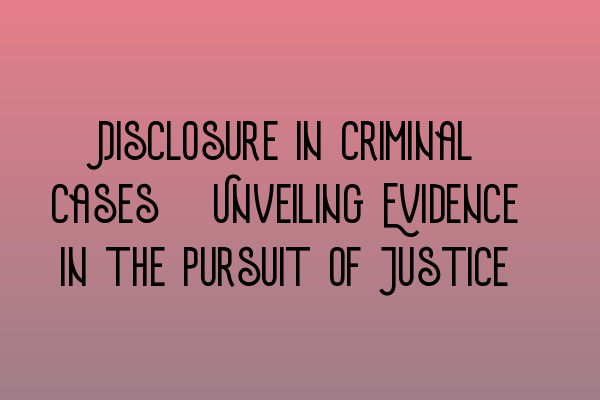Disclosure in Criminal Cases: Unveiling Evidence in the Pursuit of Justice
At SQE Criminal Law & Practice Law UK, we understand the importance of disclosure in criminal cases. In order to ensure a fair trial and uphold the principles of justice, it is vital that all relevant evidence is unveiled and made available to the parties involved. Disclosure plays a crucial role in enabling the accused to prepare their defense and the prosecution to present their case effectively.
The Importance of Disclosure
Disclosure refers to the process of sharing evidence between the prosecution and the defense in a criminal case. It is a fundamental component of the criminal justice system and helps to safeguard the rights of the accused. Through disclosure, both parties gain access to the necessary information to conduct a fair trial.
When evidence is disclosed, it allows the defense to scrutinize the case against their client and identify any weaknesses or inconsistencies. This helps them to build a strong defense strategy and challenge the prosecution’s evidence effectively. Disclosure also ensures transparency and prevents any surprises in the courtroom, allowing for a level playing field for both sides.
The Legal Framework for Disclosure
The legal framework for disclosure in criminal cases is set out in the Criminal Procedure and Investigations Act 1996. According to this legislation, both the prosecution and the defense have a duty to disclose any material that is relevant to the case, regardless of whether it supports their position or not.
This duty extends to both unused material, which refers to evidence that is not being relied upon by the prosecution, and sensitive material, which may include information that could have an impact on an individual’s privacy or safety. The disclosure process also involves a careful consideration of public interest immunity, ensuring that sensitive information is handled appropriately.
Challenges and Considerations
While disclosure is a critical aspect of the criminal justice process, it is not without its challenges. The volume of digital evidence, such as emails, social media posts, and CCTV footage, has increased significantly in recent years. This poses difficulties in terms of review, analysis, and timely disclosure.
In addition, issues of disclosure can arise when dealing with complex and sensitive cases, such as those involving national security or confidential informants. Striking the right balance between the need for disclosure and the protection of individuals and interests can be particularly challenging in such scenarios.
Furthermore, the cost associated with disclosure can be a burden on the criminal justice system. The need for comprehensive review and analysis of evidence, particularly in large-scale cases, requires dedicated resources and advanced technologies for efficient processing and disclosure.
The Way Forward
Recognizing the importance of disclosure in criminal cases, SQE Criminal Law & Practice Law UK is committed to providing comprehensive training and resources to future legal professionals. Our SQE 1 and SQE 2 Preparation Courses equip students with the necessary knowledge and skills to navigate the complexities of disclosure within the criminal justice system.
If you’re preparing for the SQE exams, we highly recommend practicing with our SQE 1 Practice Exam Questions and taking our SQE 1 Practice Mocks FLK1 FLK2. These resources will not only help you understand the intricacies of disclosure but also enhance your overall understanding of criminal law and practice.
Stay up-to-date with the latest SRA SQE Exam Dates to plan your preparation effectively. Our SQE 2 Preparation Courses are designed to cover all relevant areas, including disclosure, ensuring that aspiring solicitors are equipped to handle the challenges of the criminal justice system.
Conclusion
Disclosure in criminal cases is essential for a fair and just trial. It empowers the defense to prepare a robust strategy, protects the rights of the accused, and ensures the effective presentation of the prosecution’s case. Despite the challenges and considerations, disclosure remains a cornerstone of the criminal justice system. With proper training and resources, future legal professionals can navigate these complexities and uphold the principles of justice.
